“Are you old?”
“No. I’m only twelve. But I’ve been that for a long time.”
— John Ajvide Lindqvist, Let the Right One In
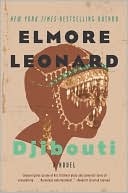 |
Djibouti, by Elmore Leonard I’ve always loved Elmore Leonard’s novels, not just for the pitch perfect dialogue, but also for the inevitable presence of memorably cool characters: Chili Palmer, Ray Givens, Karen Sisco, Vince Majestyk, Jackie Burke … the list goes on and on. In Djibouti, coolness comes close to achieving critical mass, there are so many of these characters in one place: Dara the documentary-maker; Xavier the laconic seen-it-all sidekick; Billy the horny billionaire and his intelligent supermodel lover Helene; Idris and Harry, Somali pirates in it for the glamor; Jama the American prisoner turned Muslim, carrying out jihad for al Qaeda apparently just for kicks. One could be forgiven for thinking each of these characters is just like the other, so similar are they in their sardonic outlook on the absurdities of life, the casual way they embrace violence and crime, the ease with which they confront even the most dangerous situations, and above all, their interchangeable unflappable cool.
There is an odd section of the novel where Dara and Xavier move the narrative along by wisecracking over raw video outtakes of confrontations with Somali pirates on a laptop computer, a bit of virtuoso experimentation that seemed, well, unnecessary. I can see, in Djibouti, why some people find Leonard’s later novels too playful to be taken seriously. |
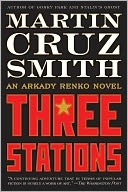 |
Three Stations, by Martin Cruz Smith Every time I read a Martin Cruz Smith novel, I marvel again over just how good he is. This one, the latest Arkady Renko novel, is the shortest yet (under 200 pages). It’s fast-moving, not just because it’s short but because it’s tightly plotted. As with other Arkady Renko stories, it takes place against a backdrop of corrupt police, criminal oligarchs, and the poorest of the poor (who are not Dickens-style poor but barbarian wretches who’d rob their own mothers on their deathbeds). The familiar plot lines are here: Arkady is out of favor with his bosses, almost no one is willing to help him investigate a crime, Arkady plods on regardless of professional and personal danger. So is it cookie-cutter Renko? Maybe. But it’s so damn good you don’t care. Imagine an alternate universe where a one-hour police procedural on TV was actually good. Now imagine a universe where that one-hour police procedural on TV was ten times better than that. That approaches how good Three Stations is. |
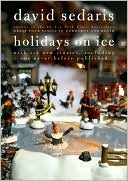 |
Holidays on Ice, by David Sedaris A few of the older David Sedaris stories. Although the blurb on the book cover said it contained some new ones, I found that I had either read most of them before, probably in The New Yorker, or heard David Sedaris read them on NPR. The two or three stories from Sedaris’ own life are hilarious. The stories Sedaris makes up are disappointingly and pointlessly cruel, ugly for pure ugliness’ sake. I was a bit taken aback by that. |
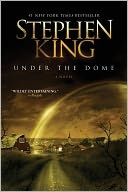 |
Under the Dome, by Stephen King Reading Stephen King doesn’t have to be a guilty pleasure. He’s a good storyteller, and his best stuff appeals to that teenage love of horror and science fiction that never quite leaves you, no matter how grown up you’ve become. Under the Dome reads like early King, and satisfies the itch that attracted you to King in the first place. Actually, as you’ll learn in the author’s afterword, Under the Dome actually is early King: he started working on the novel back in 1975 but in his own words, it didn’t gel until now. This is a long novel (almost 900 pages), and there are times you’ll wish King would quit stringing you along with protracted conversations between characters or quite so many little cliffhangers, but you’ll have a hard time putting it down. I was annoyed, off and on throughout the novel, with the formulaic nature of King’s writing. During the story a number of characters faint or are knocked senseless in various gruesome ways. Every single one of them — and there are at least 20 of these scenes — wets him- or herself. Really? It made me think of all the old radio shows that used the identical car crash sound clip, over and over. And bleeding. There’s a lot of bleeding, quite often from the eyes. Then there’s the hand-flapping — any time a character gestures with his or her hands, King invariably describes it as “flapping.” He flapped his hands in frustration; she flapped her hand derisively, etc. King has his cookie cutters, and he loves to use them. I read Under the Dome as an e-book. When they converted this novel into e-pub format, words that were hyphenated for line breaks on the printed page kept the hyphen, even though on the e-book page they show up in the middle or beginning of lines. You keep running into situ-ations like this. I’ve noticed this problem in other e-books, so it’s not just this novel. It’s a minor irritation, but an irritation nonetheless. Those small criticisms aside, Under the Dome is classic King. Good characters, a fascinating science fiction hook, and plenty of horrifying thrills. If you liked King’s early novels, you’ll like Under the Dome. |
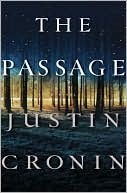 |
The Passage, by Justin Cronin Justin Cronin’s 800-page science-fictionish end-times thriller is actually pretty good. You won’t be able to keep yourself from comparing this with similar works by Stephen King, but Cronin is, I think, the better writer … his characters are more fleshed out, he keeps his focus on the plot and action, and he avoids the endless page-filler dialog and episodic cliff-hanger construction so characteristic of King. The concept of The Passage could easily have come from King, though … a super-secret military program to breed a virus that will give humans extraordinary strength and longevity turns them into vampire-like killers, who wind up killing off all but a few isolated pockets of humanity, and a heroic, danger-fraught quest by a small group of humans to find the answers. This was an e-book, and I read it on my Nook. When I reviewed the e-book version of Stephen King’s Under the Dome (above), I commented on the lack of editing to fix problems created by the transition from print to e-book form. That didn’t seem to be a problem with The Passage — there were no misplaced hyphens or line breaks. No, the editing problem in this book was an old-fashioned one: Cronin’s use of the word “wretch” when he meant “retch.” The first time I thought, well, that one got by the editors. But there were several more instances of “wretching” in the book. Do publishers no longer pay editors to go through manuscripts they’re about to publish? Apparently some, at least, do not. Wretched retching aside, The Passage is good stuff … if you want a fun read, you can’t go wrong with this one. |
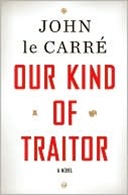 |
Our Kind of Traitor, by John le Carre John le Carre’s latest, Our Kind of Traitor, tells the story of a Russian mobster who has been betrayed by his crime family, betraying his crime family in turn by offering to exchange what he knows for sanctuary in England for himself and his extended family, betrayed in turn by England. Le Carre is at his best when he mixes worldly cynicism with arcane espionage tradecraft, but he’s also not bad at creating suspense and sympathetic, human characters. I thought le Carre’s previous novel, A Most Wanted Man (previously reviewed here), seemed hastily written; not so this one, which kept me glued to my e-reader from start to finish. |
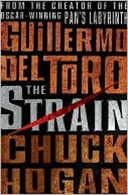 |
The Strain, by Guillermo del Toro & Chuck Hogan This started off well, with a genuinely terrifying situation (a 777 with nearly 300 passengers rolls to a stop on a taxiway at JFK after landing, lights out, engines shut down, no radio contact) and a great, detailed, realistic response on the part of law enforcement, DHS, and the CDC … and then segues into a vampire novel, and not a terribly good one. Oh, there are thrills and chills galore, but the realism and detail of the first chapter go right out the window once the bloodsucking begins. An ever-growing number of logical questions occurred to me as I read, none of which the authors answered. The Strain is the first book of a trilogy (the second book is out, the third due soon). If I find a copy of the second book in my library, I may read it, but I’m not going to spend money on a copy of my own. |
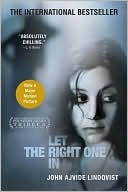 |
Let the Right One In, by John Ajvide Lindqvist I watched the dubbed-English version of the movie about a month ago. It was fascinating, entertaining, and deeply creepy — one of the most impressive movies I’ve seen in a while. But, being a movie, some aspects of the story seemed rushed and I thought parts were missing. So I immediately ordered the book from my local library. Good move: as I suspected, there is much more to the story than can be stuffed into a 115-minute movie, and it is all rewarding. Lately I’ve been on a vampire jag, but except for Bram Stoker’s original Dracula (previously reviewed here), the other vampire thrillers I’ve read have been full of internal inconsistencies. Not Let the Right One In. If there were vampires, this is how it would probably be. But far more importantly, this is just a damn good story. Even without Eli, Oskar’s world is interesting and believable. With Eli, it is fascinating, entertaining, and yes, deeply creepy. I could not put this book down even for a minute — I read it straight through, my hair standing up the whole time. |
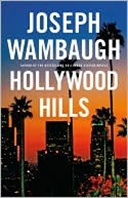 |
Hollywood Hills, by Joseph Wambaugh Pretty good old-school Wambaugh, a series of humorous and interesting police squad room war stories woven into a core crime story, this one involving art theft, surfers, and druggies. The only off-putting aspect of the story is Wambaugh’s insistent dropping of celebrity names, as if it’s news that famous people live in or near Hollywood. Perhaps he thought he’d boost sales if names like Lindsay Lohan and Brangelina were splashed across the blurbs on the back cover. And an oddity … Wambaugh calls realtors Realtors. It would have been a typo if he did it once, but he does it every time. I’m still scratching my head over that one. Still, Hollywood Hills is a quick and enjoyable read. |
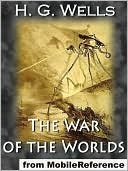 |
The War of the Worlds, by H.G. Wells I wonder how many of us think we’ve read a book when in fact we haven’t? Perhaps because of a famous book’s strong influence on other books we’ve read, or because we’ve seen movies based on the book, or merely because we’ve read other books by the same author, we just assume we’ve read them all … such was the case with me and H.G. Wells’ The War of the Worlds. The minute I started reading this short novella, I realized the story was new to me. I expected Edwardian rectitude, but was instead startled by how good TWOTW is, how suspenseful, how chill-inducing. Not only that, but the well-remembered movie of the 1950s or 60s was nowhere near as close to the book as the more recent film starring Tom Cruise. I guess, back 50 or 60 years ago, movie producers were too squeamish to explore the idea of Martians sucking the blood out of living humans … for once I’m glad I live in modern times, because that was one of the coolest parts of Wells’ story! A great read, better gotten around to late than never … and you can download it to your Kindle or Nook for free! |